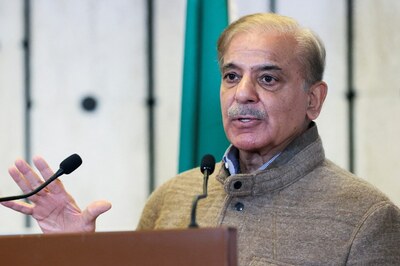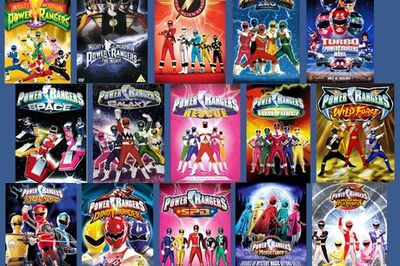
views
Gwalior: Atal Bihari Vajpayee, a politician par excellence who was known for his matchless wit and statesmanship, shared a special bond with Madhya Pradesh’s Gwalior where he was born and spent his formative years.
Former prime minister Atal Bihari Vajpayee passes away aged 93. Follow Live Updates here.
The sixth child among seven brothers and sisters, Vajpayee was born in a middle-class, Brahmin family to Krishna Devi and Krishna Bihari Vajpayee on December 25, 1924, in Gwalior’s Kamal Singh ka Bagh area.
His grandfather Pandit Shyam Lal Vajpayee had migrated to Morena from his ancestral village of Bateshwar in Uttar Pradesh. Many contest that Vajpayee was born in Bateshwar but it is primarily believed that he was born when his family switched base to Gwalior on the invitation of the Scindias, who wanted his school teacher father to settle in their kingdom.
Vajpayee stayed in Gwalior till he completed his graduation from Victoria College and moved to Kanpur for pursuing post-graduation. It was then that Maharaja of Gwalior Jivaji Rao Scindia offered him a scholarship of Rs 75 a month, a handsome amount then, on the condition that he would remain in his service for three years after completing his education.
However, after initially flirting with communism, Vajpayee had developed an inkling for the Rashtriya Swayamsevak Sangh (RSS) in the 1940s and thus pleaded with the Maharaja to waive his service condition so that he could opt for a full-time career in politics. The benevolent Maharaja did not disappoint the young nationalist poet.
Destiny came a full circle around four decades later when Vajpayee, whom the Scindias proudly showed off as their creation, took on royal family scion Madhav Rao Scindia in 1984.
A national political figure by then, Vajpayee — despite having Scindia’s mother and the then BJP vice president Vijaya Raje Scindia by his side and his national stature — fought tooth and nail against a spirited Scindia and lost by over two lakh votes, a rare blemish in his illustrious political career.
The election is still etched in the minds of the locals as one of the epic electoral battles in India’s political history. It is this election that caused the life-long rift between Madhav Rao Scindia and his mother who was heartbroken when her son revolted against her to join the Congress, which she had left two decades ago.
However, despite the loss, Vajpayee’s fondness for the fort city never ceased to exist.
What added to the sweetness of the bond was Gwalior’s famous Bahadura Sweets. Vajpayee was so fond of the desi ghee ladoos that one of the national English dailies had termed them as the ‘Passport to PM.’ Even after attaining global fame, Vajpayee kept coming back to the shop whenever possible to savour the delicacy. His family too never forgot to carry the sweets to New Delhi when they visited him.
Vajpayee’s childhood friend, octogenarian Ramrakhan Misra, said the former prime minister loved the local delicacies and often enjoyed them in the company of his friends.
Simplicity was a trade Vajpayee was famous for. His nephew Deepak, in an interview earlier, had recounted how his uncle rode a bicycle through Gwalior in the 70s despite being an acclaimed politician who had won the 1971 election. Vajpayee, who was always seen in a dhoti, had asked Deepak to get him a bicycle meant for women as it was easier to ride.
One of his acquaintances also recounted how the master statesman loved poetry since childhood and took part in poetic conventions at an early age.
Vajpayee, who enjoyed playing hockey as a youngster, was extremely popular in school, an acquaintance told News18. He recounted how once, when the former prime minister fell ill in school, his principal paid a visit to his home to enquire about his health.
Decades after Vajpayee attained matchless fame in Indian politics, he still remained an approachable friend for many in Gwalior. In a previous interview, his old associate Jhammanlal, who has an ironing shop in Naya Bazaar in Gwalior, recounted an instance which stood testimony to Vajpayee’s simplicity.
“When Atal ji was serving as minister of external affairs from 1975 to 1979, he once reached Gwalior from Punjab Mail and landed at my shop. He asked me to quickly down the shutters and spent time with close friends over snacks and tea,” said Jhammanlal.
However, as the news of his presence reached the administration, the entire area was turned into a citadel. Jhammanlal recounted how Vajpayee had once ironed his coat at his shop and befriended him. For years, Jan Sangh leaders kept meeting at his shop and even decided tickets at his outlet as it was situated in the main bazaar, which gave them the feel of local politics.
A prominent exponent of Hindi language, Vajpayee was praised for delivering his speech at the United Nations in Hindi. He kept contributing to the language, especially in the functioning of the Hindi Bhawan in Gwalior, till the time he was in the city. Recognising his role, locals paid tributes to him by building a temple dedicated to him where they held functions on his birthday.
Gwalior Mela, an annual trade and culture fair, was also quite close to his heart and he often paid a visit to the extravaganza.
However, many rue the fact that apart from an institute — Atal Bihari Indian Institute of Information and Technology — Gwalior has no landmark dedicated to the legendary politician.
The veteran statesman, who passed away at the age of 93, stopped visiting Gwalior a while ago but its residents will always carry fond memories of the iconic politician.




















Comments
0 comment